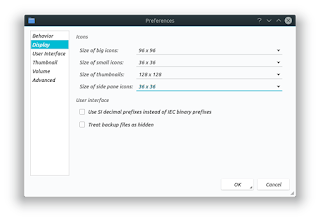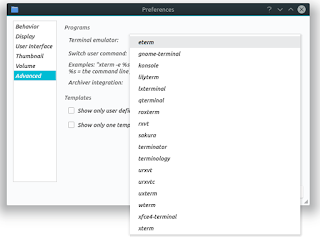 |
| File Management options abound in the Land of Tux |
Today, however, I'm going to take a quick look at one such alternative option out there - PCManFM-Qt. PCManFM-Qt is the Qt port of PCManFM, the file manager of LXDE. From the website it adds:
"In LXQt sessions it is in addition used to handle the desktop. Nevertheless it can be used independently of LXQt as well."
Since it's a Qt port of the file manager, and it's readily available in the repos for Debian-based systems, I couldn't help but give it a spin and see if there would be a reason to look at it as a viable option for those who may want an alternative to Dolphin or Konqueror.
 |
| This is, in fact, PCManFM-Qt, despite there being no "Qt" designation on the 'about' page |
 |
| PCManFM-Qt |
About PCManFM
PCManFM's claim to fame is it's speed. Touted as fast and light, it was developed to be a lightweight rival to other file managers. Mainly, GNOME Files, Dolphin and Thunar.
A few highlights from the project's webpage:
- Extremly fast and lightweight
- Can be started in one second on normal machine
- Tabbed browsing (Similar to Firefox)
- Built-in volume management (mount/umount/eject through HAL)
- Built-in file searching utility (GUI frontend for the UNIX find + grep command)
- Drag & Drop support
- Files can be dragged among tabs
- Load large directories in reasonable time
- File association support (Default application)
- Thumbnail for image files
- Bookmarks support
- Handles non-UTF-8 encoded filenames correctly
- Provides icon view, compact view, and detailed list view
- Standard compliant (Follows FreeDesktop.org)
- Clean and user-friendly interface
Testing the "lightweight" part compared to Dolphin, in KDE Plasma 5.12, we see the following memory usage:
- Dolphin ~ 23.4 Mb
- PCManFM-Qt ~ 14.4 Mb
While the latter clearly has less memory usage, that makes sense. It was both built that way and has less features out of the box than Dolphin. I will add, however, that using even the most modest PC today one would likely not notice any tangible difference between the two. It's simply not enough to matter, though one might understand that at one time anything using less resources would be welcome.
Using PCManFM-Qt:
One of the first things I noticed when firing up the application for the first time, was how tiny the default icons were, and how I already missed Dolphin's slider to increase their size right from the GUI. No such luck in PCManFM. One has to go into the settings to adjust that. Easy enough, but not as nice or convenient as Dolphin.
 |
| The icons by default are a wee-bit tiny |
A quick adjustment in the settings had them scaled larger and to a more easily readable state, although I would have still liked the option to make them bigger. They cap out at 96 DPI, if memory serves correctly. On the plus side of things, I noticed the following:
- Simple, clean interface
- Lots of options for what terminal the application will use if you invoke the terminal from the menu
- Integrated archiving capabilities with lots of compression application options
- Tabs are nice
- All the main file management functions are there and work
- Drag and drop
- Right-click context menu with basic options
- Standard keyboard shortcuts
- Allow for different context views on Places Panel
- Good built-in search capabilities
 |
| The icon size selector in settings, however no slider on the main GUI |
 |
| Standard, yet basic, right-click context menu options |
 |
| PCManFM-Qt plays nicely with several terminal emulators |
 |
| Selecting Konsole as the default terminal should you need to use it |
What I missed:
- The first thing I miss when comparing to Dolphin, as noted above, is the slider to adjust icon size
- There is nothing in the "about" section that indicates you are running the Qt version
- No split-screen
- It does offer multiple tabs for easy copy and paste procedures
- However Dolphin has those as well, and additionally the ability to also create a new window
- It does not look like there is a viable option for doing root operations outside of dropping to a terminal
- Even though it is an option in the settings
- LXQT-sudo or GTK-sudo are recommended packages, which is of no use to Plasma users
- KDESudo is depreciated (I believe), I did not try to install it and see if it would work
- Dolphin has noticeably more right-click options out of the box, and even more available from the KDE Store
- The easy ability to drag folders onto the 'Places' section and pin them there, which is a hallmark of Dolphin
One unique thing about PCManFM-Qt
One of the really unique things that this application touts is it's inclusion if an application manager / launcher that's baked into it. You'll notice an 'Applications' entry on the left panel, and clicking it takes you to an Applications View where you can launch apps directly from the file manager. And while that sounded great at first, due to it's rather uniqueness in the file manager world, I got a weird result on my test system, as you can see from the second screenshot below:
 |
| On the left, you'll discover the Applications View, which act like a launcher for all of your installed apps |
 |
| On my KDE Neon system, however, I ended up with several duplicate entries |
All of those duped entries kind of makes the launcher functionality useless. I'm not sure why that is, or if it behaves differently on an LXQT-based set-up. Perhaps they are a result of using Snaps or Flatpaks for certain things. That's my best guess anyway.
Takeaway:
While it may be great for it's intended desktop environment, the fact that this application has a Qt interface does not make it a candidate to replace Dolphin in my opinion. And I can't think of a use-case where one would benefit from running it in KDE Plasma. While it is fast and does everything you need for basic file management tasks, what is unique about it either doesn't work properly in Plasma, or doesn't make enough of a difference to warrant a scenario whereby one would recommend it.
To be honest, that's probably more of a statement about how good Dolphin is than anything explicitly wrong with PCManFM-Qt, which mainly does what it sets out to do. For Plasma users, however, a switch to Konqueror is likely to be a better experience if one needs an alternative for their use.



No comments:
Post a Comment